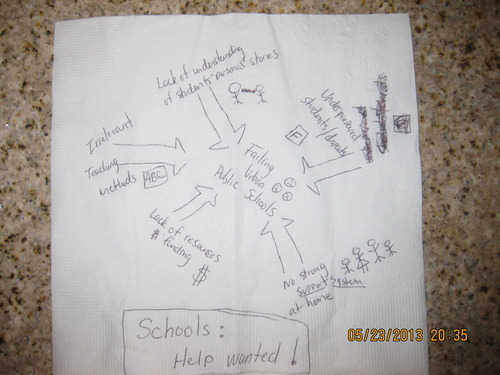Schools: Help Wanted

One of the forefront discussions in North America is the revitalization of public education. This multi-layered dialogue is often an involved matter debated in congress, social media, community forums, classrooms and by former and current educational professionals. The reality is that most urban schools in the public education system are broken; they seem to produce more underprepared graduates than prepared graduates. They are failing. With that in mind, I have offered a visual of some proposed causes that I have researched regarding this dilemma. Below I explain the model and further identify the needs.
-
Everyone needs a support system, especially school-age children. However, many of them lack such in their broken and dysfunctional homes. These students need someone they can trust and feel free to talk about anything with. They need those who are willing to intentionally remind them of school assignments and deadlines, and then follow up to see the finished product. Students like to know that someone cares.
-
Resources are vital to every mission. Urban schools in some states are nearly decades behind in maintenance and technological upgrades. Often times, urban schools do not receive the designated funds to move forward with providing a campus for students to be proud to call their own. With allotted funds not making it to the urban schools and resourceful families relocating to better schools, the urban schools are quickly to become dilapidated for the remaining students. A resourceful school leads to a thriving school.
-
Stories teach us about people but first they have to be told. Many teachers have communicated a sense of disconnect with urban students. On the other hand, some teachers determined to connect with students have given their students an opportunity to share their stories future dreams. Such listening and understanding on the teachers’ part allowed for relationships to be established and for teaching to take place. Mutual understanding sets the student/teacher relationship up for longstanding success.
-
It has been said that a city is as strong as its citizens’ education. In many urban areas, high school dropouts flood neighborhoods. In fact, for many of the students that do graduate from urban school, students are underprepared for college and are often pushed through. With better urban schools and educated students, cities across America will get stronger economically.
-
It is important that learning takes place in the classroom. Irrelevant teaching methods contribute to disengagement and a lack of learning among urban students. Recently, an expert in an urban schooled shared that her students were not illiterate but alliterate. Her students engage music, social media, and poetry as a preferred learning style over traditional methods that are outdated and irrelevant to her students’ daily reality. When she adapted her teaching method to their culture, she captured their interest and was able to help them learn.
Creating this napkin drawing has helped in clearly pinpointing issues. It seems that one diagram leads to another and another in an effort to further breakdown situations and come up with solutions.
Leave a Reply
You must be logged in to post a comment.